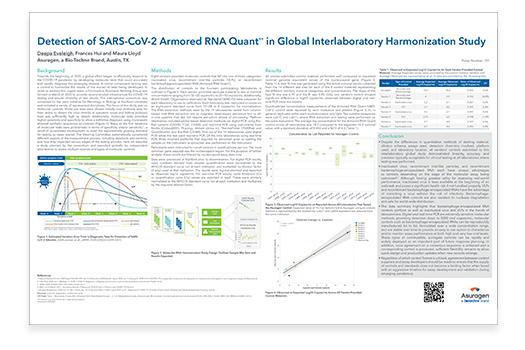Detection of SARS-CoV-2 Armored RNA Quant® in Global Interlaboratory Harmonization Study
by Deepa Eveleigh, Frances Hui, Maura Lloyd. Asuragen, a Bio-Techne brand
Scientific Meeting PostersScientific Meeting Posters Summary

Towards the beginning of 2020 a global effort began to effectively respond to the COVID-19 pandemic by developing molecular tests that could accurately and rapidly diagnose this emerging disease. A critical component lacking was a control to harmonize the results of the myriad of tests being developed. In order to address this urgent need, a Coronavirus Standards Working Group was formed in March of 2020 to provide recommended infrastructure for COVID-19 testing and ensure reliability of test results. This international consortium was convened by the Joint Initiative for Metrology in Biology at Stanford University and included a variety of represented disciplines. The focus of this study was on molecular controls. Molecular tests were chosen initially over antibody tests for their ability to detect the virus directly at symptom onset and before antibody load was sufficiently high to detect. Additionally, molecular tests provided higher sensitivity and specificity to allow a definitive diagnosis using more easily attained synthetic sequences as controls (Figure 1). Many of the first iterations of molecular tests were problematic in terms of specificity and/or sensitivity a result of accelerated development to meet the exponentially growing demand for testing as cases soared. The Steering Committee systematically considered different aspects of the measurement process, including standards and controls, and how they impacted various stages of the testing process. Here we describe a study planned by the consortium and executed globally by independent laboratories to assess multiple sources and types of molecular controls.
Request Literature
To access this literature content please fill out the form below.